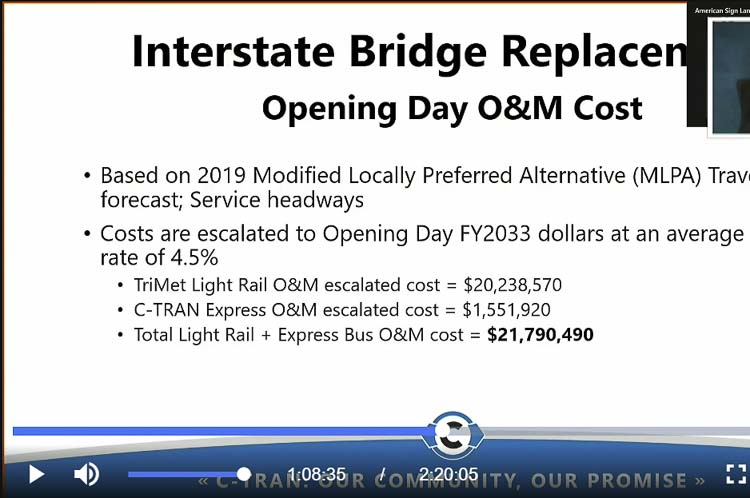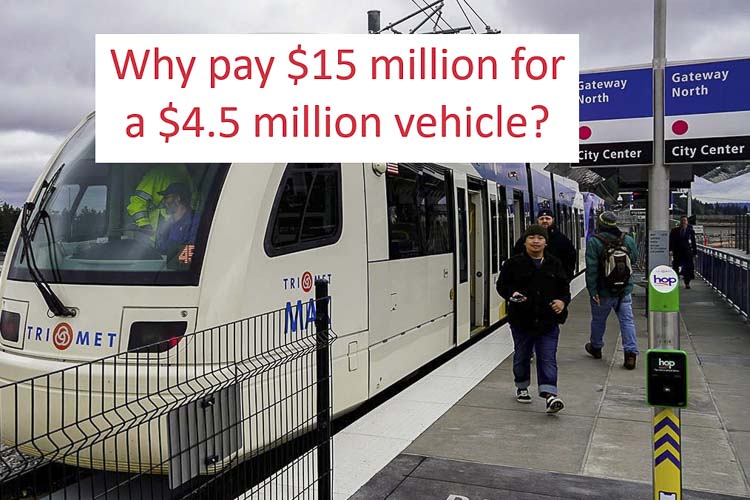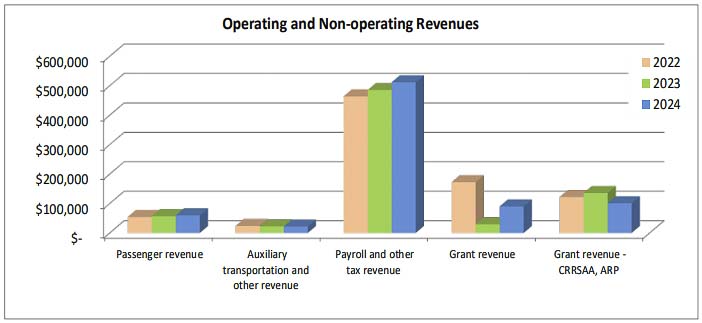
Should C-TRAN’s Board reject paying for light rail?
John Ley
For Clark County Today
There is currently an important debate happening in city and County Council chambers around Clark County. Do we direct the C-TRAN Board to accept paying for TriMet Operations and Maintenance (O&M) costs or not? At stake is $7 million annually to cover O&M costs for the 4,390 feet of the light rail extension in Washington state.
Keep in mind that over the past decade, Portland’s TriMet has had $6 billion in operating losses. Its 10-year financial projection is to burn through another $1.1 billion in cash.
“TriMet is drowning in costs and they’re looking for Washington taxpayers to throw them a life ring,” said radio talk show host Lars Larson. “I say let ‘em sink, kill the billion dollar choo choo, and build a new bridge that actually serves the needs of citizens.”
On March 11, members of the C-TRAN Board will discuss and vote on a resolution to refuse to be obligated to pay any TriMet light rail costs. The Camas City Council has taken it a step further unanimously passing a resolution against light rail on the bridge. “The City states its opposition to the Light Rail extension as part of the I-5 Interstate Bridge Replacement project and urges this component to be removed in its entirety,” the resolution concludes.

How it began
The current discussion began in June 2022 as part of the Interstate Bridge Replacement Program (IBR) discussions on a Modified Locally Preferred Alternative (MLPA) for the project. TriMet’s JC Vanneta told Washington and Oregon legislators “TriMet will not be responsible for O&M costs resulting from the extension into Vancouver.”
The C-TRAN Board of Directors agreed to the MPLA with the condition that the Clark County transit organization would not be responsible for any light rail costs. “C-TRAN’s position has consistently been that C-TRAN will not be responsible for costs related to operations and maintenance of light rail in Clark County, including any park and ride facilities that may be constructed as part of the project,” said then CEO Shawn Donaghy.
Just over a year later, it was reported TriMet was seeking nearly $22 million per year in O&M cost reimbursements. The $21.6 million TriMet is seeking would equal about $11.8 million per mile. In FY 2022, TriMet spent $128.1 million on operations for its entire 60-mile MAX light rail system. That equals about $2.1 million per mile. Why is the IBR seeking over five times that amount?
The simple answer: they’re losing money every year. The 2024 budget planned for the Portland transit agency to lose money every year for the next decade. Their Annual Report indicated an operating loss of $850 million.
Economist Joe Cortright said operating funds must be identified prior to getting federal money for the capital costs of transit related to the I-5 Bridge replacement project. “Neither C-TRAN nor TriMet is willing to commit any funds of their own to this project,” he said. “This is especially important because the USDOT (Federal Transit Administration) won’t fund the capital construction of a project that has no source of operating funds.
“TriMet’s board considered their endorsement of the project last Wednesday,” Cortright continued. “They voted to go ahead, provided somebody else pays for its entire costs.”
As part of the I-5 Bridge replacement project, TriMet is demanding 19 new light rail vehicles for the 1.83 mile extension of the existing Yellow Line. They report an expected cost of $190 million to $290 million for those new vehicles, part of which would be paid for by Washington taxpayers, as the federal government will only cover half the cost.

The TriMet Board of Directors approved “a number of significant conditions that must be satisfactorily addressed prior to Program completion.” Those conditions included the 2013 significant expansion of the TriMet Ruby Junction facility in Gresham, an upgrade to Portland’s Steel Bridge, and issues regarding the proposed Vancouver waterfront light rail station.
The current debate repeats a pattern of TriMet and Oregon trying to get Washington taxpayers to pay for costs that rightfully belong to Portland and Oregon taxpayers.
The current battle
In November 2024, Vancouver Mayor Anne McEnerny Ogle as chair of C-TRAN Board, introduced a resolution to reverse their position against paying for TriMet light rail O&M costs. Citizens should know that C-TRAN has been operating buses into Portland since 1981. TriMet and Portland have never contributed a penny towards operating costs of C-TRAN service.
Hard questions were asked by Camas Council Member Tim Hein regarding increased financial risk to C-TRAN. In the end, the board eliminated their objection to paying for light rail O&M costs. Several members had reservations.
Then in December, the bill came due. TriMet’s plan included $7.2 million per year from either C-TRAN or Clark County taxpayers.
“I’m having sticker shock here,” said Vancouver City Council Member Bart Hansen. Councilors Michelle Belkot (Clark County) and Tim Hein (Camas) pushed back against the TriMet demand after details of the $21 million (total) in projected costs were revealed.
The financial projections expected passenger fares to cover 25 percent of O&M costs. If that doesn’t happen, then taxpayers would have an additional financial burden. Presently farebox recovery for TriMet is about 10 percent, indicating taxpayers cover 90 cents of every dollar of costs. C-TRAN’s Scott Patterson said “the estimated farebox recovery of 25 percent is overly optimistic.”
“This looks to me to be C-TRAN subsidizing TriMet,” Belkot said.
“It seems to be in complete conflict with what I’ve known in the past,” said Hansen.
The TriMet FY2024 Annual Report indicates passenger fares have dropped from $123 million in FY2015 to $59 million. Passenger fares cover 7.9 percent of the $931 million annual operating costs. Last year, TriMet lost $850 million, up nearly 30 percent from 2021’s loss of $656 million.

In the past decade, TriMet’s operating losses have increased from $383 million in 2015 to $850 million in 2024. During that decade, total operating losses exceeded $6 billion. With seemingly never ending losses, TriMet is seeking “help” from all taxpayers.
But the feeling coming from the various city councils has been “no thanks” when it comes to bailing out TriMet. Last week the Washougal City Council indicated they reject paying for light rail O&M. On Monday evening, the Battle Ground City Council will weigh in.
Without Washington tax dollars, can light rail survive as part of the project?
Also read:
- Busy pavement season ahead on Vancouver streetsThe city of Vancouver is set to repave and preserve 76 lane miles across 20 neighborhoods in summer 2025, with ADA upgrades and community notices throughout.
- State representative: Expect sticker shock when Interstate Bridge project officials reveal price, tolling plansAt a town hall in Battle Ground, Rep. John Ley warned of major cost increases and tolling burdens tied to the Interstate Bridge replacement project.
- Opinion: Washington state lawmakers increase the cost of driving – againBob Pishue of Mountain States Policy Center argues that new vehicle and fuel taxes in Washington will raise driving costs while diverting funds away from roads.
- Overnight full closure of I-5 near Woodland for bridge inspection, May 6WSDOT will fully close southbound I-5 near Woodland overnight on Tuesday, May 6 for a bridge inspection using a chain drag test.
- Opinion: Do we still need TriMet?John A. Charles Jr. of the Cascade Policy Institute argues that TriMet should halt expansion plans and prepare for major service reductions in response to falling ridership and rising costs.










What is the “need” for light rail? How many bus trips are there daily over I-5 Bridge?
IBR written presentations to the cities and county council (twice) in 2025 have not included transit ridership data, although the program has spent $10,377,973 on transit planning and engineering. What is the justification?
of $7.5 Billion currently estimated for IBR I-5 Bridge, $2 Billion is allocated to Light Rail, How many people ride the buses to Portland daily? Ridership?
“We will provide an update as this process moves forward and when there is more information to share.” Feb.26 Clark County Council presentation
Over half Interstate Bridge proposal allocated to transit, pedestrians and bicyclists
https://www.clarkcountytoday.com/news/over-half-interstate-bridge-proposal-allocated-to-transit-pedestrians-and-bicyclists/
IBR, ” “We want to accommodate folks who do not drive.” How many folks take transit buses, walk, Bike, or use a mobility device over I-5 Bridge?
What about freight? service and commercial vehicles? Emergency vehicles? Vehicles? motorcycles? How many freight vehicles cross I-5 daily?
Purpose per DSEIS, a primary purpose of IBR is to” improve highway freight mobility and address interstate travel and commerce needs in the Program area;”
“Truck-hauled freight movement over the I-5 Columbia River crossing is critical for industrial centers, for employment, and for the regional and national economies”
Whatever happened to the freight lane? Apparently it was replaced with light rail, which seems to be top priority for IBR.
.
If I could, I’d click on the ” + ” to give you a thumbs up on your comment. But CCT has evidently taken away that feature.
This bridge boondoggle, unless checked, will result in a massive tax burden for Clark County residents for generations to come.
Hi Susan, I’ve fixed that feature. Thank you!
Look, folks like the idea of light rail.It doesn’t use petroleum products to operate and it’s quiet. So the enthusiasts feel everybody will be happy paying for it. Wrong. CTRAN has no jumbo slush fund to pay for the operations. Their next budget projection has them using their income from sales taxes and fares to pay for what they’re doing now. So Saying CTRAN can help fund light rail means they need to get more$ from our sales taxes. I read somewhere that the legislature is thinking about letting tolls help repay the bonds which help pay cost of light rail- which will never be self supporting. So if we get light rail the tax payers and toll payers will be supporting it forever.
There’s an unconsidered impact on Oregonians considering visiting our new waterfront development. Let’s see. You get to pay toll both ways, increased sales taxes,and a less than great pay parking garage. Can somebody explain any real benefit of light rail to the vast % of us who will never use it?
There is no net positive. The bums will have an easier time getting up to Vancouver’s downtown and waterfront district.
Sounds like the new Vancouver mayor is getting kickbacks for pushing this project. Classic corruption from our elected officials.
On Monday evening, the Battle Ground City Council voted to reject light rail on the IBR.
They also object to paying for any aspect of TriMet’s operations and maintenance.
The city council of La Center has also spoken against the light rail component and funding TriMet O&M costs.
Our small cities are all coming out against the proposed light rail and spending taxpayer dollars to pay for TriMet’s MAX light rail.
Will Vancouver pay attention to the representatives of our many small cities, and the majority of Clark County voters?
To preface, I have no qualms whatsoever about due diligence and ensuring that our taxpayer dollars are being spent wisely and well. Nor do I take issue with you presenting your arguments for how we should think about those issues.
With that being said, this article is objectively not “News” – it belongs in the “Opinion” section. You are an elected official who campaigned extensively on this very issue. Every quote is from a person aligned with your position. There is no representation of the opposing viewpoint whatsoever, nor any indication that you sought any.
With due respect to the editorial staff, this should never have been categorized as “News.”
Kudos to Rep. John Ley for sharing his findings with the public. I agree with his proposal to Audit the IBR, as the CRC was audited and found to be wasteful. Other candidates hid their support for light rail on the campaign trail and claimed to support affordable transportation options. $2 Billion currently estimated for Light rail is the most expensive, least flexible public transit option for I-5, and it duplicates existing bus service unnecessarily. Practically, the sensitive overhead electric lines freeze in winter, and over-heat in summer, stopping the trains and the cost to operate and maintain the system is also higher than buses. On a bridge over the Columbia River in winter, light rail could unreliable.
I’ll just point out again, that I think Mr. Ley should be free to share his own opinions of the bridge replacement plans. It just isn’t a news article.
First, because as much as he is obviously dedicated to the issue, there is absolutely no metric by which he could be considered even remotely neutral on the topic.
Second, because I’m sure that, were we to have comments from proponents of the rail, they would have their own perspectives and analyses to share. Alas, we don’t know, because no such person was contacted for comment.
That’s why this isn’t a news article – it’s an opinion piece.
Forthright — I appreciate your perspective. My guess is that most people didn’t know that TriMet lost $6 billion over the past decade.
My guess is that most people didn’t know that their financial projections indicate they will lose an additional $1.1 billion over the next decade. Those huge losses may or may not be “news” to most people. But thank you for reading the article. 🙂
Hi John, I appreciate you weighing in. I think we can safely imagine that there are a great many things that most people don’t know.
We could, for example, wonder from whence you derive your claim of $6 billion in losses over the past decade. It is a curious statement, given that TriMet’s most recent audited comprehensive financial report (FY2024) does not reflect an overall deficit of that magnitude. There is a conveniently formatted “Statement of Net Position, Last Ten Years” section (pages 106-109), but you seem to have missed the additional lines below “operating expenses” in your calculations. If we look at the final totals (called, “Net Position,” down at the bottom), it seems that TriMet is doing just fine.
We have further support for that idea in the form of TriMet receiving yet another AAA bond rating (the highest possible rating) from external auditors in 2024. KBRA (the rating group) specifically cited, “TriMet’s diverse and strong economic base” in support of that conclusion. Quite a curious position for them to take, if we are to believe your statement about their ongoing dramatic losses.
The simple answer is that TriMet, like C-Tran, is not primarily funded by operating revenues, but by tax and grant revenues. By only subtracting operating costs from operating expenses, you have incorrectly excluded the majority of their income. In fact, if we were to apply your method (specifically, “operating revenues minus operating expenses”) to the most recent C-Tran financial report (page 63), then we would be forced to conclude that C-Tran has experienced losses of half a billion dollars over the past 10 years.
I’m assuming that this oversight on your part is a result of your unfamiliarity with how financial reports are written. This is an understandable mistake, as audit documents are highly technical. And though understandable, it has nevertheless led to you make erroneous claims – errors that no doubt could have been avoided had you consulted with individuals more experienced in the field of accounting, for example.
Given, as I hope has been adequately demonstrated above, that you are in error regarding the overall financial performance of TriMet, it stands to reason that your other analyses may contain similar inadvertent mistakes. And again, I don’t at all begrudge the calls for greater oversight and scrutiny of public projects. That said, I do think it’s important for that oversight be conducted in a rigorous and systematic way by folks who are expert in the field – not, with no offense intended, on the back of a napkin.
Happy to provide feedback on some of the other questionable analyses in your article, if that would be helpful to you. Thank you for your interest and investment in our community.